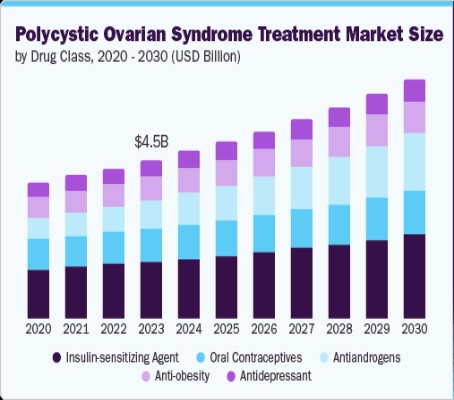"Grasping PCOD: Signs, Identification, and Effects on Women's Well-being"
We are excited to welcome you to our webinar on Polycystic Ovarian Disease (PCOD), scheduled for June 19, 2025. This session will feature expert insights on the causes, diagnosis, and management of PCOD, offering valuable takeaways for healthcare professionals, researchers, and individuals seeking a deeper understanding of this condition.
This webinar is designed to provide valuable knowledge, expert insights, and practical solutions for managing PCOD effectively. With leading healthcare professionals and specialists sharing their expertise, we aim to create awareness, debunk myths, and empower individuals with the right information.
Join us for an insightful PCOD Webinar designed to spread awareness and provide expert guidance on Polycystic Ovarian Disease (PCOD). This virtual event will bring together leading healthcare professionals, researchers, and wellness experts to discuss the latest developments in PCOD diagnosis, treatment, and holistic management.
This webinar is designed to provide in-depth knowledge and expert insights on Polycystic Ovarian Disease (PCOD), covering various aspects of diagnosis, treatment, lifestyle, and mental well-being.

Polycystic Ovarian Disease (PCOD) is a common hormonal disorder that affects individuals with ovaries, primarily during their reproductive years. It occurs when the ovaries produce excessive androgens (male hormones), leading to hormonal imbalances. This imbalance disrupts the menstrual cycle, often causing irregular or missed periods. One of the key characteristics of PCOD is the development of multiple small cysts on the ovaries, which can interfere with normal ovulation. Common causes of PCOD include genetic predisposition, insulin resistance, obesity, and lifestyle factors such as poor diet and lack of exercise. Symptoms vary but often include weight gain, acne, excessive hair growth (hirsutism), thinning scalp hair, and fertility issues.
Hormonal imbalance occurs when there is too much or too little of a specific hormone in the body, disrupting various physiological processes. Since hormones regulate essential functions such as metabolism, growth, mood, and reproduction, even a slight imbalance can lead to significant health issues. Common causes of hormonal imbalance include stress, poor diet, medical conditions like thyroid disorders or polycystic ovarian disease (PCOD), and lifestyle factors such as lack of sleep and sedentary habits. The impact of hormonal imbalances varies depending on the affected hormones but often includes irregular menstrual cycles, weight fluctuations, fatigue, mood swings, skin problems, and changes in appetite. In severe cases, long-term imbalances may contribute to conditions like diabetes, infertility, osteoporosis, and cardiovascular diseases.
Proper nutrition and diet management play a crucial role in managing Polycystic Ovarian Disease (PCOD) by helping to regulate hormones, improve insulin sensitivity, and reduce symptoms. A well-balanced diet for PCOD should focus on whole, nutrient-dense foods while minimizing processed and high-sugar foods that can contribute to insulin resistance and hormonal imbalances. Incorporating complex carbohydrates such as whole grains, legumes, and fiber-rich vegetables helps stabilize blood sugar levels, while lean proteins and healthy fats from sources like fish, nuts, and seeds support hormone regulation. Anti-inflammatory foods, including berries, leafy greens, and turmeric, can help reduce inflammation, which is often linked to PCOD. Additionally, avoiding excessive caffeine, sugary drinks, and trans fats can prevent hormonal disruptions.
Polycystic Ovarian Disease (PCOD) is a hormonal disorder that affects women of reproductive age, leading to irregular menstrual cycles, weight gain, insulin resistance, and other metabolic issues. Exercise and lifestyle modifications play a crucial role in managing PCOD symptoms and improving overall health. Regular physical activity, such as aerobic exercises, strength training, and yoga, helps in weight management, enhances insulin sensitivity, and reduces androgen levels, which can alleviate symptoms like acne and excessive hair growth. A balanced diet rich in fiber, lean proteins, and healthy fats while minimizing processed foods and refined sugars is essential for maintaining hormonal balance. Stress management techniques, such as meditation and adequate sleep, also contribute to hormonal regulation. By adopting these lifestyle changes, women with PCOD can improve their reproductive health, reduce the risk of complications like diabetes and heart disease, and enhance their overall well-being.
Medications are often prescribed to regulate menstrual cycles, control symptoms, and reduce the risk of complications. Birth control pills containing estrogen and progestin are commonly used to balance hormone levels, regulate periods, and reduce excessive hair growth and acne. For women trying to conceive, ovulation-inducing medications such as clomiphene citrate or letrozole may be recommended. Metformin, a medication used for diabetes, is also prescribed to improve insulin sensitivity and lower blood sugar levels, which can help manage PCOD symptoms. Anti-androgen medications like spironolactone may be used to reduce male hormone effects, such as hair thinning and excessive hair growth. Additionally, lifestyle changes, including a healthy diet, regular exercise, and weight management, play a crucial role in controlling PCOD and enhancing the effectiveness of medical treatments. In severe cases where medication and lifestyle changes do not yield results, surgical procedures such as laparoscopic ovarian drilling (LOD) may be considered to induce ovulation.
Polycystic Ovarian Disease (PCOD) is a hormonal disorder that affects many aspects of a person’s health, including their mental well-being. The hormonal imbalances, irregular menstrual cycles, and physical symptoms such as weight gain, acne, and excessive hair growth can lead to emotional distress, anxiety, and depression. Many individuals with PCOD struggle with body image issues and low self-esteem due to these changes. Additionally, insulin resistance, which is common in PCOD, has been linked to mood disturbances and an increased risk of mental health disorders. The stress of managing the condition, combined with societal pressures and fertility concerns, can further impact emotional health. It is crucial for individuals with PCOD to seek mental health support alongside medical treatment, engage in stress-relieving activities like exercise or meditation, and maintain a balanced lifestyle to improve overall well-being.
Fertility and reproductive health are essential aspects of overall well-being, influencing both physical and emotional health. Fertility refers to the ability to conceive and carry a pregnancy to term, while reproductive health encompasses a broader spectrum, including menstrual health, hormonal balance, and the proper functioning of reproductive organs. Various factors, such as age, lifestyle, underlying medical conditions, and environmental influences, can impact fertility.
Ayurveda, the ancient Indian system of medicine, offers holistic approaches to managing PCOD by balancing the body's doshas—Vata, Pitta, and Kapha. Ayurvedic treatments focus on detoxification (Panchakarma), dietary modifications, and herbal remedies like Ashwagandha, Shatavari, and Triphala, which help regulate hormones and improve reproductive health. Lifestyle practices such as yoga, meditation, and pranayama are also recommended to reduce stress and enhance hormonal balance. Additionally, alternative therapies like acupuncture, naturopathy, and homeopathy have shown promise in managing symptoms by addressing the root cause rather than just alleviating symptoms. A combination of these natural therapies, along with a disciplined lifestyle and mindful eating, can significantly improve overall well-being in women with PCOD.
Weight management is a crucial aspect of dealing with Polycystic Ovarian Disease (PCOD), as excess weight can worsen hormonal imbalances and insulin resistance, leading to more severe symptoms. A well-balanced diet rich in fiber, lean proteins, and healthy fats while minimizing refined carbohydrates and sugars helps regulate blood sugar levels and prevent weight gain. Regular physical activity, such as strength training, yoga, and cardiovascular exercises, boosts metabolism and improves insulin sensitivity.
Polycystic Ovarian Disease (PCOD) is a common hormonal disorder affecting adolescents, often characterized by irregular menstrual cycles, excessive hair growth (hirsutism), acne, and weight gain. It occurs due to an imbalance of androgens (male hormones) and insulin resistance, leading to multiple cysts in the ovaries. Early detection is crucial in managing PCOD effectively, as it can prevent long-term complications such as infertility, type 2 diabetes, and cardiovascular diseases. Warning signs like irregular periods, sudden weight gain, and severe acne should prompt medical consultation. Lifestyle changes, including a balanced diet and regular exercise, play a key role in managing symptoms. Early diagnosis through blood tests and ultrasounds, along with timely medical intervention, can help adolescents maintain hormonal balance and overall health.
Polycystic Ovarian Disease (PCOD) can cause various skin and hair issues due to hormonal imbalances, particularly an excess of androgens. Common concerns include acne, oily skin, pigmentation, excessive hair growth (hirsutism), and hair thinning or hair loss (androgenic alopecia). A proper skincare and haircare routine can help manage these symptoms effectively. For skin, using gentle cleansers, oil-free moisturizers, and non-comedogenic products can prevent breakouts. Exfoliating with mild acids like salicylic acid can help unclog pores, while sunscreen is essential to protect against hyperpigmentation. For hair, using mild, sulfate-free shampoos, nourishing oils like coconut or argan oil, and scalp massages can promote hair health. A diet rich in antioxidants, omega-3 fatty acids, and biotin, along with stress management and regular exercise, can further support healthier skin and hair in PCOD.
Addressing and managing Polycystic Ovarian Disease (PCOD) entails a comprehensive approach that incorporates lifestyle changes, medical advice, and mental fortitude. Given that PCOD influences hormone levels, metabolism, and overall well-being, many women encounter challenges such as irregular menstrual cycles, weight gain, acne, and fertility issues. Nevertheless, with appropriate methods, these difficulties can be successfully managed. A nutritious diet composed of whole foods, lean proteins, and fiber aids in regulating insulin levels, which is vital in the management of PCOD. Engaging in regular physical activity, including strength training and cardiovascular exercise, enhances metabolism and alleviates symptoms. Moreover, managing stress through practices like yoga, meditation, and mindfulness is essential for hormone balance. Medical treatments such as prescribed medications and supplements also provide additional support in the recovery process.
Our webinars are thoughtfully designed to deliver value to a wide range of individuals. Whether you're looking to grow your skills, explore new opportunities or gain insights from experts, here's who will benefit most from attending:
If you're aiming to advance in your career or stay updated with the latest trends in your field, this webinar is perfect for you. Gain actionable insights and learn from industry experts.
Professors, scholars, and students presenting findings or exploring the latest research in their field and individuals looking for collaboration opportunities.
Discover strategies, tools, and techniques to scale your business, enhance productivity, and achieve your goals. This is your chance to learn from real-world success stories.
Are you curious about new concepts or looking to bridge the gap between academia and industry? Our webinars provide practical knowledge that goes beyond textbooks.
Stay ahead of the curve! If you're passionate about the topic and want to understand the latest innovations, trends, or developments, you'll find immense value here.
In a world where knowledge is power, webinars have emerged as one of the most accessible and impactful ways to learn, grow and connect. Don't miss the chance to learn, grow and connect in ways that truly matter.
Webinars are often hosted by industry experts, thought leaders, and innovators. Attending gives you direct access to their insights, strategies, and expertise that you can immediately apply in your personal or professional life.
The digital world evolves rapidly. Webinars provide up-to-date information on the latest trends, tools, and techniques, ensuring you stay ahead of the curve in your industry or area of interest.
Webinars aren't just passive presentations they're dynamic and interactive. Participate in live Q&A sessions, answer polls, and share your thoughts with like-minded participants.
Webinars connect you with professionals, experts, and enthusiasts from around the globe. It's a unique opportunity to grow your network and collaborate with others who share your interests.
Many webinars are free or available at a fraction of the cost of in-person events. This makes them an affordable way to learn from experts without incurring travel or accommodation expenses.
Webinars often include access to resources such as presentation slides, e-books and recordings. These materials ensure you can revisit the content and reinforce your learning anytime.
A great webinar can spark new ideas and reinvigorate your passion for a topic. The insights you gain may open new opportunities or provide the push you need to achieve your goals.
Webinars are designed with specific audiences in mind. Whether you're seeking professional development, personal growth, or technical know-how, you're likely to find a webinar that suits your interests perfectly.
Stay ahead of the curve! If you're passionate about the topic and want to understand the latest innovations, trends, or developments, you'll find immense value here.
Best platform for Global business and Networking opportunities B2B Meetings Poster Sessions on every career stage Networking Opportunities
Registering for a webinar is essential to gain access to the unique opportunities and secure a chance to grow, connect and gain insights that can drive your personal and professional success. Webinars are more than just online meetings, they're gateways to knowledge, innovation, and growth.

The global market for treating polycystic ovarian syndrome was valued at USD 4.53 billion in 2023 and is expected to expand at a compound annual growth rate (CAGR) of 6.5% between 2024 and 2030. This growth is largely due to changes in lifestyle, increased alcohol consumption, rising levels of anxiety and depression, and hormonal imbalances. According to data released by the World Health Organization (WHO) in June 2023, PCOS affects 8-13% of women of reproductive age, with approximately 70% of those affected remaining undiagnosed worldwide.
The incidence of diabetes is increasing among individuals with polycystic ovarian syndrome. The World Health Organization (WHO) indicates that women who have a family history of type 2 diabetes are more susceptible to developing polycystic ovarian syndrome. Furthermore, the Centers for Disease Control and Prevention (CDC) has reported that individuals with this condition cannot produce insulin, a crucial hormone for regulating blood sugar, which leads to insulin resistance and the development of type 2 diabetes. The rise in such chronic conditions is anticipated to propel the growth of the treatment market.
Obesity also plays a significant role in the development of polycystic ovarian syndrome. The World Health Organization (WHO) reported that in 2022, 2.5 billion adults were classified as overweight, with women making up 44% of this population. Many individuals suffering from this syndrome also experience obesity, and the progression of weight gain is linked to the worsening of PCOS, as per endocrine experts. The increase in these health issues, along with the growing number of polycystic ovarian syndrome cases, is contributing to market expansion.




